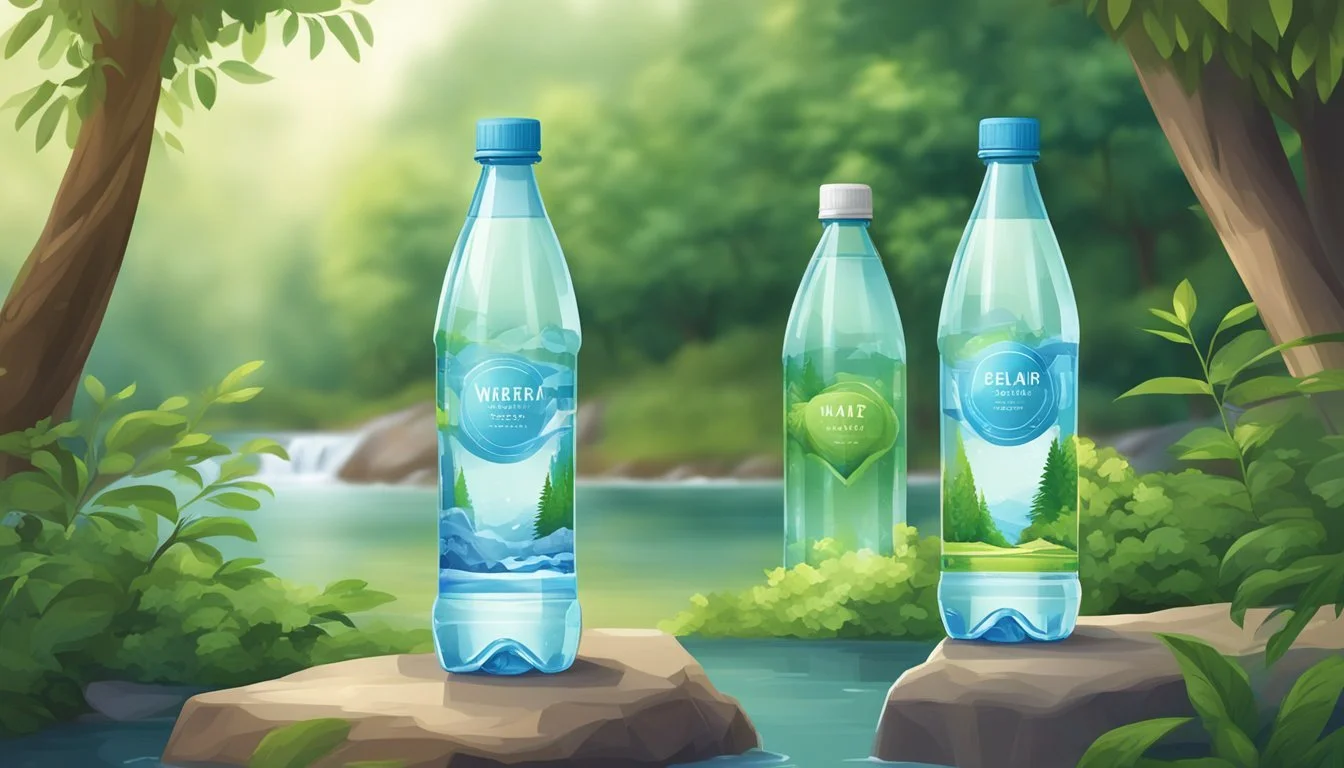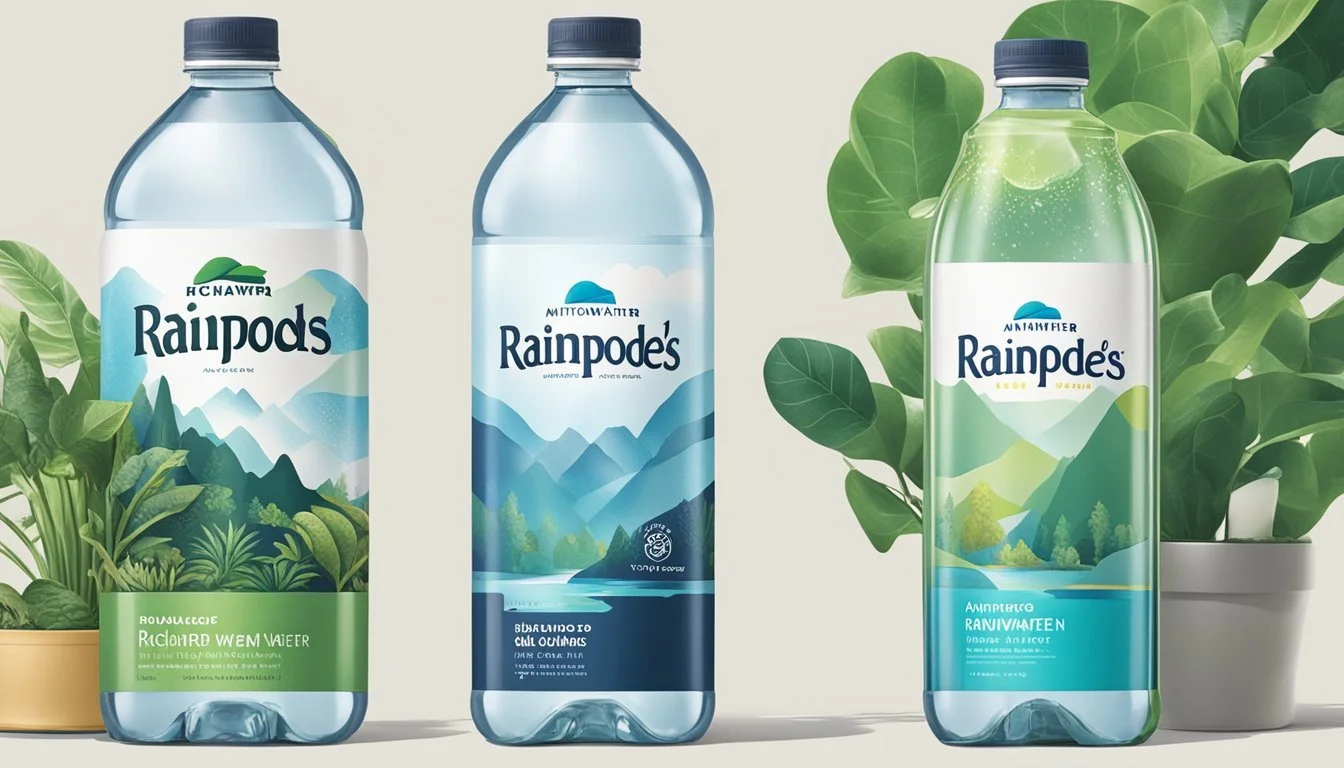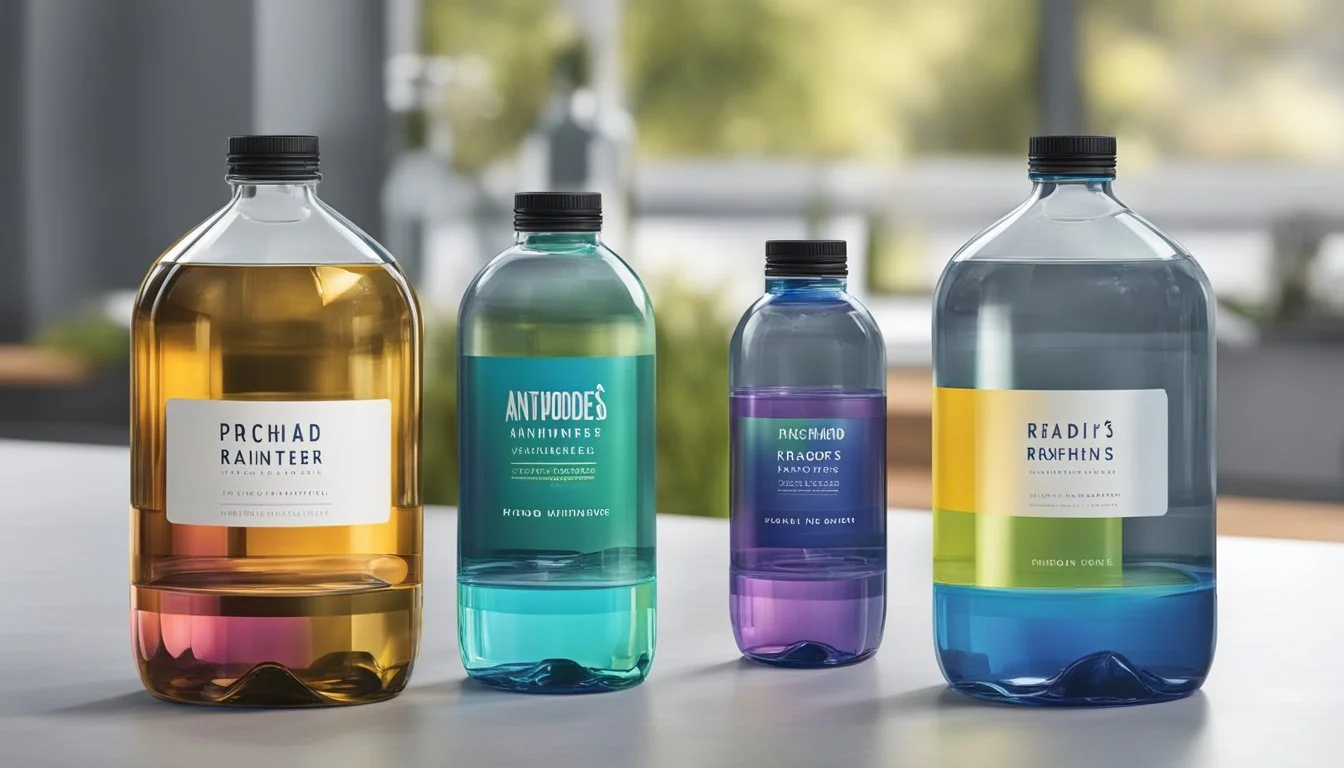Antipodes vs. Richard’s Rainwater
A Comparative Analysis
Bottled water enthusiasts often find themselves choosing between Antipodes and Richard’s Rainwater. While Antipodes boasts an artisan touch with its naturally filtered groundwater from New Zealand, Richard’s Rainwater offers a sustainable and innovative solution by capturing rainwater before it hits the ground, ensuring a fresh and pure product.
Antipodes prides itself on its pristine source and the mineral composition that gives its water a unique taste. On the other hand, Richard’s Rainwater emphasizes eco-friendly practices, saving thousands of gallons of potential stormwater runoff and turning it into drinkable water.
Both brands promise high-quality hydration, but each takes a different approach to deliver purity and sustainability to consumers. So, which bottled water should you choose for your next refreshing sip? Let's dive deeper into what sets them apart.
Overview of Antipodes and Richard's Rainwater
Antipodes and Richard’s Rainwater stand out in the bottled water industry due to their unique origins and innovative practices. This section provides details on each brand’s history and development.
Origin and Brand History
Antipodes is a premium bottled water brand from New Zealand, known for sourcing water from an ancient aquifer. Positioned as a luxury product, it emphasizes purity and a clean, mineral-rich taste. The brand's sophisticated packaging appeals to consumers seeking high-quality hydration.
Richard’s Rainwater began with founder Richard Heinichen's vision to utilize rainwater as a pure drinking source. The company prides itself on capturing and purifying rainwater efficiently. Established in Austin, Texas, the rainwater collection process ensures minimal environmental impact and contributes to community water supplies.
Richard's Rainwater Journey in Austin, Texas
Richard’s Rainwater started in Austin, Texas. Key milestones include establishing rainwater harvesting systems and refining a proprietary filtration method. The company collected roughly 4 million gallons of rainwater in 2022 across two U.S. locations.
Using sustainable practices, Richard’s Rainwater ensures more water is available for consumption compared to municipal sources. The brand’s innovative approach and commitment to zero-waste filtration have made it a notable name in the bottled water sector. The refreshed brand design aims to attract consumers while promoting a sustainable and pure water source.
Water Sourcing and Environmental Impact
Antipodes and Richard’s Rainwater exemplify different approaches to sourcing water and addressing environmental concerns. By understanding their methods and sustainability initiatives, consumers can make more informed choices.
Sources of Water
Antipodes sources its water from deep subterranean aquifers. These aquifers are protected from external contaminants, ensuring pure and mineral-rich spring water.
Richard’s Rainwater captures rain before it hits the ground, hence it's collected in its purest form. This method relies heavily on natural precipitation, particularly clouds. Their water is 100% potable and naturally filtered through the collection process.
Rainwater Collection and Renewable Sources
Richard’s Rainwater utilizes an innovative approach by capturing rainwater, which is a highly renewable resource. This method helps prevent storm runoff in urban areas, which can lead to flooding and water pollution.
By using clouds as the primary source, Richard’s Rainwater saved over 400,000 gallons of water last year. This amount is enough to hydrate 2,000 people for an entire year, showcasing the efficiency and sustainability of rainwater collection.
Antipodes’s water sourcing from aquifers is also renewable, but it requires a lengthy natural replenishment process. The water cycle between rain, infiltration, and storage in aquifers is slower, thus making immediate renewability a challenge.
Environmental Sustainability Initiatives
Richard’s Rainwater emphasizes keeping water local, distributing it no more than 100 miles from the bottling source. This reduces the carbon footprint associated with transportation.
Their packaging and operations aim to minimize environmental impact. Upcoming projects include installing rainwater collection systems and fountains in public places like stadiums.
Antipodes focuses on maintaining the purity of its source and employs eco-friendly packaging solutions. They continue to explore ways to reduce their overall environmental footprint, balancing the demand for pure, still water with sustainable practices.
In terms of environmental impact, Richard’s Rainwater demonstrates a clear commitment to sustainability through innovative collection methods and local distribution. Meanwhile, Antipodes leverages the natural filtration of aquifers while striving to enhance their sustainability initiatives.
Water Quality and Purification Processes
Antipodes and Richard’s Rainwater differ significantly in their water quality and methods of purification, impacting the final product and safety for consumers.
Filtration and Purifying Techniques
Richard’s Rainwater employs a proprietary, almost zero-waste filtration system to clean collected rainwater. This process capitalizes on rain’s natural purity, reducing the need for extensive chemical treatments. By capturing rain before it hits the ground, they minimize contamination from urban runoff, making it a cleaner source from the outset.
Antipodes, sourced from an aquifer, undergoes multiple filtration stages. The water is first filtered to remove large particles and sediment. It then goes through advanced purifying processes like reverse osmosis, which effectively eliminates contaminants such as lead, chlorine, fluoride, and ammonia. This extensive purification ensures high-quality water, but some natural minerals may be stripped away as a result.
Comparison of Quality Standards
Richard’s Rainwater maintains its water quality by adhering to stringent standards. Their bottled water is 100% potable, meeting all regulations for human consumption. The process ensures that the water is free from harmful chemicals and microorganisms.
Antipodes adheres to both local and international bottled water standards. The water undergoes regular testing to ensure it is free from harmful levels of lead, ammonia, and other contaminants. Their rigorous filtration methods guarantee the removal of various impurities while retaining essential minerals, thus offering a balanced mineral profile desirable for many consumers.
In summary, while both brands offer high-quality water, their differing sources and purification processes cater to varied preferences and needs.
Health and Safety Considerations
When comparing Antipodes and Richard’s Rainwater, it's important to assess their health and safety considerations.
Richard’s Rainwater captures rain before it touches the ground, ensuring water purity. This method prevents contamination from urban runoff. The company emphasizes that their water is 100% potable and safe for human consumption.
Antipodes sources its water from an artesian aquifer, which naturally filters the water through layers of rock. This process results in clean, mineral-rich water.
Both brands ensure their water is safe for drinking. Richard’s Rainwater uses a closed-loop system with minimal water loss during filtration. They also highlight the renewability of clouds as a water source.
Brand Water Source Safety Features Richard’s Rainwater Captured rainwater Closed-loop filtration, 100% potable Antipodes Artesian aquifer Natural rock filtration
Municipal water is often treated with chlorine, fluoride, or other chemicals to ensure safety. Bottled water like Richard’s Rainwater and Antipodes offer alternatives without these additives, which some consumers prefer.
Bottled water industry standards require rigorous testing to meet safety regulations. Both brands adhere to these standards, providing confidence in the quality of their product.
It's crucial to consider these aspects when choosing bottled water. The health and safety protocols of both Antipodes and Richard’s Rainwater demonstrate their commitment to providing safe drinking water.
Product Offerings
Both Antipodes and Richard’s Rainwater provide a range of bottled water products, catering to different consumer preferences with options in packaging, and types of water such as still and sparkling varieties.
Varieties of Bottled Water
Antipodes offers premium bottled water primarily sourced from natural artesian wells. They provide options in both still and sparkling water. The brand prides itself on its minimalist design and high water quality, packaged in glass bottles to maintain purity and taste.
Richard’s Rainwater stands out by collecting and bottling rainwater. They focus on a sustainable approach, utilizing proprietary zero-waste filtration systems. Their product range includes still and sparkling water, available in both glass and plastic bottles. Their emphasis on eco-friendly practices makes them a unique player in the bottled water market.
Still vs Sparkling Options
Antipodes offers both still and sparkling water in elegant glass packaging. Their still water is renowned for its smooth, clean taste, while their sparkling water boasts fine bubbles and a refreshing finish. Consumers particularly appreciate the premium feel of their glass bottles.
Richard’s Rainwater provides still and sparkling rainwater. Their still water is noted for its crisp and clean flavor, a result of meticulous filtration processes. The sparkling water is lightly carbonated and offers a gentle effervescence. Packaging is versatile with both glass and plastic options, catering to different consumer preferences and fostering convenience while maintaining sustainability goals.
Marketing and Brand Presence
Both Antipodes and Richard’s Rainwater have carved out distinct spaces in the crowded bottled water market. By leveraging different aspects of social media and focusing on unique packaging design, they each appeal to their target demographics effectively.
Social Media Influence
Antipodes places a strong emphasis on Instagram and LinkedIn, showcasing their water as a luxury item. High-resolution images of their packaging and influencer partnerships play a pivotal role in their strategy. Their posts often highlight the purity of the water sourced from New Zealand, appealing to a health-conscious audience.
Richard’s Rainwater, in contrast, harnesses Facebook and Instagram to emphasize its sustainability initiatives. Their content frequently includes engaging posts about their zero-waste filtration system and rainwater harvesting process. They also share testimonials and behind-the-scenes looks at their bottling operations, underlining their commitment to the environment.
Brand Refresh and Design
Antipodes underwent a significant brand refresh in recent years. The new design features minimalist typography and clear glass bottles that highlight the water's clarity. This design shift aims to reinforce their brand as a premium, high-end product. The use of sleek, modern design elements in their labels helps attract a sophisticated consumer base.
Richard’s Rainwater revamped its packaging to reflect its eco-friendly mission. Their bottles now feature bold, bright colors and informative graphics detailing their sustainable practices. This redesign not only makes the product stand out on shelves but also educates consumers about the environmental impact of their purchase. By focusing on eye-catching, environmentally themed labels, they bolster their brand identity as a leader in sustainable bottled water.
Availability and Distribution Channels
Both Antipodes and Richard’s Rainwater have distinct pathways to reach their customers, taking advantage of retail stores and online platforms, as well as partnering with high-end vendors.
Retail Stores and Online Sales
Antipodes and Richard's Rainwater leverage extensive distribution networks. Antipodes water is available in specialty stores such as Whole Foods Market and Natural Grocers. This premium brand often features in boutique retailers and some high-end independent grocers.
Richard’s Rainwater is accessible via larger chains like Kroger and H-E-B, making it more readily available to a broader audience. It is also found in stores like Sprouts Farmers Market, catering to health-conscious consumers.
Both brands maintain robust online sales channels. Antipodes can be purchased through their official website and other online retailers including Amazon, providing convenient delivery options. Richard’s Rainwater similarly focuses on direct-to-consumer sales through its website, alongside availability on platforms like Amazon, increasing its reach significantly.
Partnerships with Premier Vendors
Antipodes prides itself on being a staple in premier restaurants, bars, and hotels due to its high-end branding and quality. It is often featured on menus of establishments that emphasize luxury and exclusivity. Coffee shops focusing on offering premium products may also serve Antipodes to their clientele.
Richard’s Rainwater, with its sustainable and eco-friendly appeal, partners with various premier vendors. This includes high-end eateries and bars that promote sustainable practices. The brand's unique offering is also appealing to eco-conscious hotels and coffee shops.
In summary, by tapping into both physical and digital sales channels and partnering with premier vendors, both Antipodes and Richard’s Rainwater ensure their products are accessible and desirable in the market.
Consumer Experience and Feedback
Consumers have come to appreciate the distinct qualities of both Antipodes and Richard’s Rainwater.
Antipodes:
Recognized for its crisp and refreshing taste, it is favored by many water sommeliers.
The branding exudes elegance, appealing to those seeking a premium water experience.
Reviews often highlight its smooth texture and balance of minerals.
Richard’s Rainwater:
Praised for its clean taste, harvested directly from raindrops.
The branding focuses on sustainability, resonating with environmentally conscious buyers.
Feedback commonly mentions the innovative zero-waste filtration system and the sense of purity with each sip.
Both brands receive high marks for quality, though their unique selling points cater to different preferences. Antipodes emphasizes a luxurious drinking experience, while Richard’s Rainwater offers a sustainable choice with a fresh, natural flavor.
A table summarizing their key attributes:
Attribute Antipodes Richard’s Rainwater Taste Crisp, refreshing Clean, pure Brand Focus Premium elegance Sustainability Consumer Appeal Luxury seekers Environmentally conscious Notable Features Smooth texture, balanced minerals Zero-waste filtration, rainwater source
The feedback from diverse consumer demographics shows a clear appreciation for these distinct bottled water brands.
Comparison and Final Thoughts
Antipodes and Richard’s Rainwater are two distinct offerings in the bottled water market, each with unique features.
Antipodes sources its water from naturally clean aquifers in New Zealand. Its selling point includes pristine quality, being naturally filtered through volcanic rock layers.
Richard’s Rainwater utilizes a proprietary technology to harvest and bottle rainwater. This method ensures the water is as pure as possible, with the rain collected before it touches the ground.
A look at their bottling processes:
Antipodes: Extracted from deep aquifers
Richard’s Rainwater: Collected and bottled directly from rainfall
Taste and Purity are also noteworthy aspects. Antipodes has a neutral taste, attributed to its natural filtration process. Richard’s Rainwater, drawing from pure rainwater, offers a fresh and clean drinking experience.
Availability might be another consideration. Antipodes tends to be found in higher-end markets and restaurants, while Richard’s Rainwater is expanding its distribution to various retail and online platforms.
In terms of packaging, both brands emphasize sustainability but use different approaches.
Antipodes uses glass bottles, which are recyclable and aimed at reducing plastic waste.
Richard’s Rainwater focuses on eco-friendly canning and uses minimal packaging to lower its carbon footprint.
Pricing varies as well, with Antipodes generally positioned as more premium, while Richard’s Rainwater is competitively priced to reach broader consumers.
In the end, the choice between Antipodes and Richard’s Rainwater boils down to personal preference, whether you value naturally filtered aquifer water or the innovation of pure rainwater harvesting.






